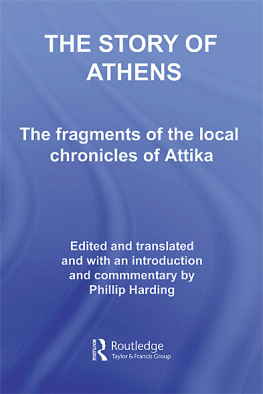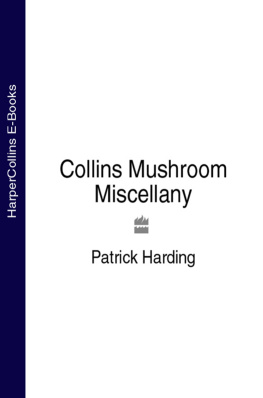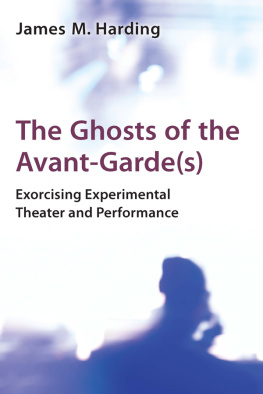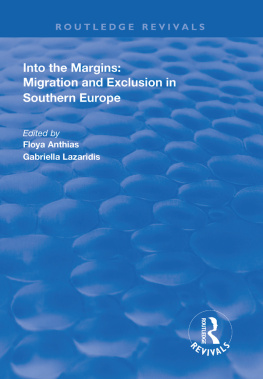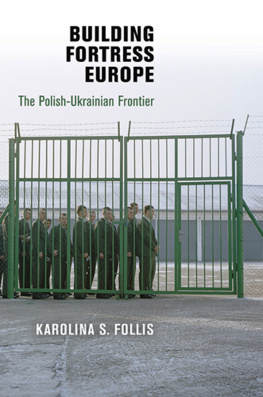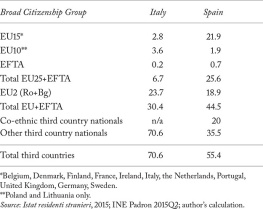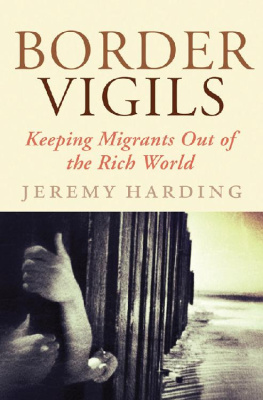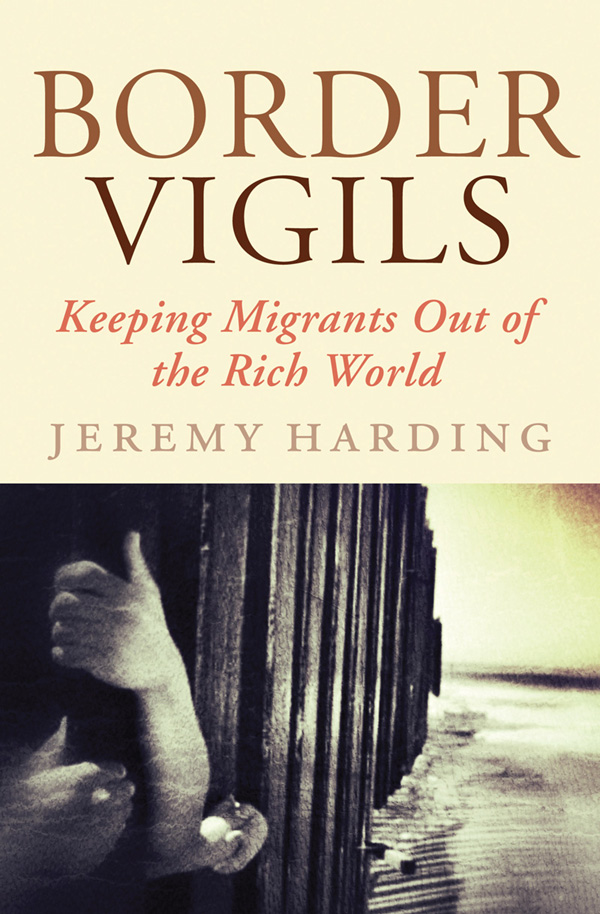
BORDER VIGILS
KEEPING MIGRANTS OUT
OF THE RICH WORLD
JEREMY HARDING

Contents
This book began as a long report at the end of the 1990s, when asylum seekers were entering Western Europe in numbers that had not been seen for sixty years or more. The arrival of hundreds of thousands of people at the frontiers of prosperous democracies followed quickly on the end of the Cold War. Mostly they came from the former Yugoslavia, but there were many from sub-Saharan Africa, Asia and the Middle East. For these unfortunate people on the move the end of history was never in view. They were fleeing penury and persecution and there were many of them. In southern Italy, the Balkans, on the Mediterranean coast of Africa, you knew it when you saw it: this was not the end of anything. The question, under the circumstances, was whether governments would honour their obligation to grant asylum.
There were reasons not to do so. One, it was sometimes said, was that asylum seekers were breaking the law by travelling in clandestinity, in breach of border protocols. A good part of this book, originally called The Uninvited , is about the journeys they made and their points of entry into Europe: about the unorthodox, dangerous routes they took into safe countries, relying on smugglers to help them, and the reasons they sometimes used forged documents or destroyed their ID papers. Clearly, if they could have left their homes in safety for a place where they were acceptable, they would have applied for visas, tendered their passports for inspection and boarded a plane like anyone else.
Asylum applications have fallen dramatically since the late 1990s, and in any case refugees are only a small proportion of the worlds population who reside outside their countries of origin. While unauthorised migration is no more than a fragment of this larger picture, it has much to tell us about the inequalities at the heart of human movement and the gulf, in terms of wealth and opportunity, between more and less developed parts of the world.
It was already obvious at the time I was reporting on this complicated situation that plenty of migrants who might not qualify as refugees by the terms of the 1951 Geneva Convention and the 1967 Protocol were in similar kinds of jeopardy. Drastic poverty was the main threat to these people in search of gainful sanctuary in functioning economies. They werent generally engineers, IT specialists, healthcare workers or management consultants who could move about respectably. They were a hidden rank and file of unskilled or semi-skilled manpower willing to sell their labour wherever they could. Like legal migrants, they were following the markets, but to do so they had to share the ordeal of asylum seekers on the same fishing smacks that left Morocco for Spain, in the same trailers rumbling over the highways of Europe. There is no provision for economic migrants in the Geneva Convention. But as matters stand they are not entitled to a proper stake in the global economy, even though they will work for next to nothing to acquire it.
And so what began as a report about asylum seekers soon became a broader look at clandestine migration to wealthy countries, from the beaches of southern Italy in the 1990s to the US/Mexican frontier a decade later, with an eye on the mounting pressure at the margins of reluctant host states and the measures they were taking to secure their borders. In 1999, just as Id begun this project, two West African teenagers, fifteen and fourteen years old, died in the rear-wheel casing of a Sabena Airbus leaving Conakry in Guinea for Brussels, where their bodies were found on arrival. These were not asylum seekers, but foolhardy chancers, eager to enrol in the new world order a utopia of energetic enterprise and ideological calm that was supposed to open up after 1989, but failed to reach Conakry. It was a shocking affair and much was written about it, but no one said of these young men that they lacked initiative. Twelve years later, on one of the last trips I made, I sat in a court house in Arizona watching dozens of unauthorised Hispanic migrants on summary trial in a fast-track deportation process. They were shackled hand and foot.
These are the images that stay in the mind when the last round of statistics is no longer accurate and the arguments have all been rehearsed: in the startling, incisive manner of political cartoons, they sketch a vivid story of aspiration, failure and ritual humiliation (chains on the feet). But migration is also a highly technical domain, where modelling and specialist conjecture allow us to look more impartially on the larger conflict between the desire for freedom of movement and sovereign decisions about who may come and go, under what terms. Ive drawn freely on the scholarly material and tried to say something, too, about the tensions between migrants and hosts: not just the government of the day and the media to which they answer, but states themselves.
There is an enduring asymmetry between the needs and entitlements of the two parties. Migrants need to cross borders but most are only entitled to do so under strict conditions. When hosts decide that they do not need migrants, they feel entitled to bar them. The needs and entitlements of hosts, in other words, are largely consonant, even when immigration control fails to achieve all their desired goals, while the needs and entitlements of migrants are at variance. Globalisation has made the imbalance more apparent. The need to migrate has not diminished but, since the 1990s, hosts have become far warier of immigrant intakes.
The 9/11 attacks, the banking meltdown of 2008 and the economic crisis have all played a part in the growing reticence of receiver countries, but so has a more general feeling that communities, however they define themselves, are within their rights to retrench in the face of globalisation. States and national economies are buffeted by globalisation we know that but individuals, local alliances, groups and classes also experience it as disempowering. Like unfettered markets, relaxed migration seems to threaten the identity which communities are struggling to maintain as gale-force trends, originating thousands of miles away, undo their ability to shape their own lives and surroundings. In this context the arrival of migrants is perceived simply as another instance of the world intruding on precarious local space and making it harder to control.
Ed Miliband, Britains Labour leader, acknowledged the difficulty in an interview in the Guardian in the summer of 2012 when he refused to dismiss rising anxieties about migrant intakes from Eastern Europe as mere prejudice. It is entirely possible to have reservations about immigration while believing in fairer payment for products from the global south. These are no more monstrous than the wish for decent wages at home. Miliband is one of many politicians who would like to recast the immigration debate in the light of brutish labour markets his phrase and the downward pressure on wages that UK employers have exerted in some sectors by hiring exclusively from a pool of Eastern European workers. Broadly speaking, this is the counter-argument to open-ended deregulation, an idea whose most liberal application would extend freedom of movement to human beings as well as goods and capital. It is at least consistent to urge regulation for all three; or indeed deregulation, as the Economist does. It is neither consistent nor fair to regulate the one but not the others.
Ive not rehearsed the worthy arguments about gifted immigrants enriching host cultures its obvious they do but I hope this book will remind readers that poorer migrants who may not excel at a sport or have a theory of relativity in their hand luggage are nonetheless responding to urgent needs of their own when they decide to cross a border, even if they have no rights in the eyes of others; that they move because of circumstances which richer economies have conspired to create; and that migration tends to redistribute wealth more efficiently than overseas aid programmes. Similarly asylum seekers a group of disadvantaged migrants who benefit in theory from the duty of states to offer refuge are often in flight because of political decisions approved in the UN Security Council. Though there are fewer asylum seekers now than there were when I was reporting from Europe after the Balkan wars, this is no guarantee that numbers will continue to fall. And numerous or not, they deserve a spirited defence.
Next page

